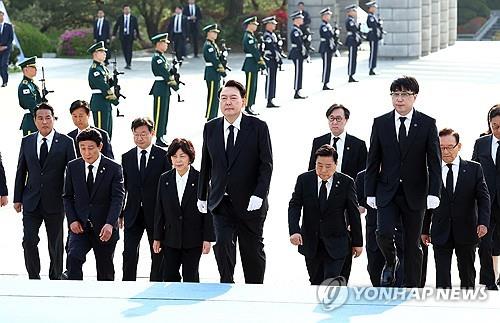(EDITORIAL from Korea Herald on March 5)
Toeing Japan's line
Sherman's speech reflects Tokyo’s stance on history
As countries around the world mark the 70th anniversary of the end of World War II, three countries in Northeast Asia ― Korea, China and Japan ― face a unique and continuing conundrum: how to resolve disputes over history so they can talk about the future.
With the conservative government of Shinzo Abe in Japan on a path to revising history in its favor, relations between Seoul and Tokyo remain icy. President Park Geun-hye, in her speech marking the 96th anniversary of the March 1 Independence Movement, a nationwide rally against Japanese colonial rule, reiterated the position that without resolving historical disputes, there can be no progress in the two countries' relations.
Park had made it clear that there would be no Korea-Japan summit meeting before the military sex slave issue is resolved. Abe, for his part, seems bent on rewriting Japan's wartime aggressions, including the Japanese government's involvement in the military sexual slavery. Although Abe said that he would uphold most of the Murayama Statement on Japan's wartime history and its apologies, Japan's Asian neighbors are concerned that Abe's own statement, to be issued in August, may backtrack on some points.
Wendy Sherman, undersecretary for political affairs at the U.S. State Department, added tinder to the fire when, in a speech on Feb. 27 given at the Carnegie Endowment for International Peace in Washington, she appeared to be chastising leaders in Korea and China for not moving forward in reconciling their differences with Japan.
Sherman was correct in noting that the "past is very much present in East Asia today. It affects the temperatures of relations between countries and helps determine how every gesture is interpreted."
She failed to pay heed to her own observation, however, when she said, "The Koreans and Chinese have quarreled with Tokyo over so-called comfort women from World War II. There are disagreements about the content of history books and even the names given to various bodies of water."
With her choice of words, Sherman trivialized the issue of military sexual slavery. Does Sherman believe the Japanese military sexual slavery, which U.S. President Barack Obama characterized as an "egregious violation of human rights," is such a trite matter that countries "quarrel" over it?
Sherman appeared to assign blame for the current stalemate in Northeast Asia to Korea and China: "Of course, nationalist feelings can still be exploited, and it's not hard for a political leader anywhere to earn cheap applause by vilifying a former enemy. But such provocations produce paralysis, not progress." How does demanding that a country accept historical facts as they are constitute "provocations"? How is it that Sherman conveniently leaves out Abe's exploitation of nationalist sentiments in Japan? In fact, Sherman's statement is regrettable in that it leaves out Japan's role in the current Northeast Asian stalemate entirely.
Perhaps Sherman's words betray her frustration with the lack of progress in Northeast Asia. In fact, her frustration over Korea and Japan not getting along when it is in the best interests of the U.S. for its two allies in the region to cooperate is probably shared by many in Washington who ask why the two neighbors can't just bury the past and move on.
That may be a pragmatic solution ― there are many pressing matters, the North Korean nuclear development prime among them, that require close cooperation among Korea, the U.S., China and Japan. Yet the future is built based on history, and without proper accounting for the past, the future that Korea and Japan build will rest on a shaky foundation, one that may not withstand the test of time and topple at the slightest stress.
During a press conference at the Blue House last April, Obama said there should be an "accurate and clear account" of what happened and urged both Korea and Japan to find ways to resolve the past. Sherman should perhaps pay closer attention to what her boss has been saying.
(END)
-
 S. Korea marks 30th anniv. of Korean Pavilion at Venice Biennale with contemporary art
S. Korea marks 30th anniv. of Korean Pavilion at Venice Biennale with contemporary art -
 Artist Lee Bae captures ethereal Korean aesthetics at Venice Biennale
Artist Lee Bae captures ethereal Korean aesthetics at Venice Biennale -
 Ateez member Yunho throws first pitch at MLB match between Dodgers, Mets
Ateez member Yunho throws first pitch at MLB match between Dodgers, Mets -
 Gov't likely to accept university chiefs' request to lower med school enrollment quota
Gov't likely to accept university chiefs' request to lower med school enrollment quota -
 S. Korea supports resolution backing U.N. membership of Palestine
S. Korea supports resolution backing U.N. membership of Palestine
-
 Artist Lee Bae captures ethereal Korean aesthetics at Venice Biennale
Artist Lee Bae captures ethereal Korean aesthetics at Venice Biennale -
 S. Korea marks 30th anniv. of Korean Pavilion at Venice Biennale with contemporary art
S. Korea marks 30th anniv. of Korean Pavilion at Venice Biennale with contemporary art -
 Gov't likely to accept university chiefs' request to lower med school enrollment quota
Gov't likely to accept university chiefs' request to lower med school enrollment quota -
 Looming weekly closure of major hospitals feared to worsen medical service crisis
Looming weekly closure of major hospitals feared to worsen medical service crisis -
 Yoon's approval rating sinks to lowest point since taking office
Yoon's approval rating sinks to lowest point since taking office
-
 U.S. will take steps for three-way engagement on nuclear deterrence with S. Korea, Japan: Campbell
U.S. will take steps for three-way engagement on nuclear deterrence with S. Korea, Japan: Campbell -
 (LEAD) Hybe to file complaint against sublabel executives over internal conflict
(LEAD) Hybe to file complaint against sublabel executives over internal conflict -
 Looming weekly closure of major hospitals feared to worsen medical service crisis
Looming weekly closure of major hospitals feared to worsen medical service crisis -
 Author of ADOR's 'internal document' refutes allegations of spinoff plot
Author of ADOR's 'internal document' refutes allegations of spinoff plot -
 U.S. SPACECOM commander says N.K.'s satellite launch violates U.N. resolutions
U.S. SPACECOM commander says N.K.'s satellite launch violates U.N. resolutions




















